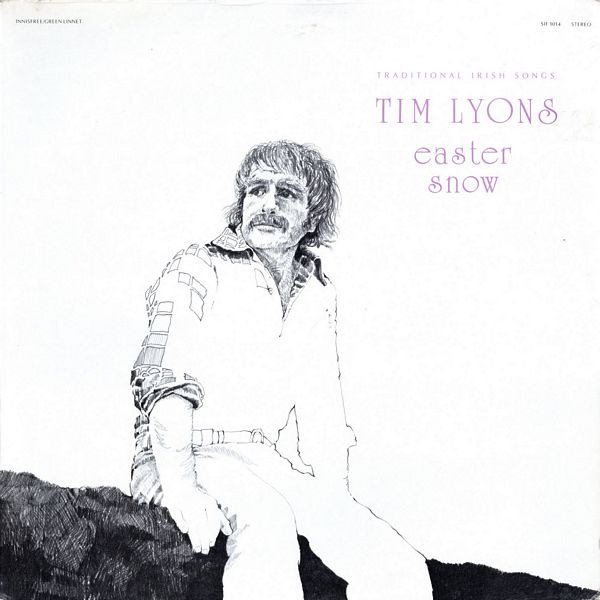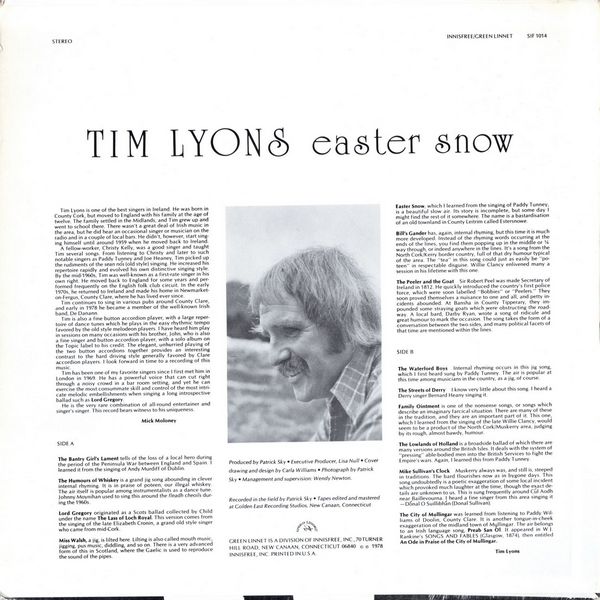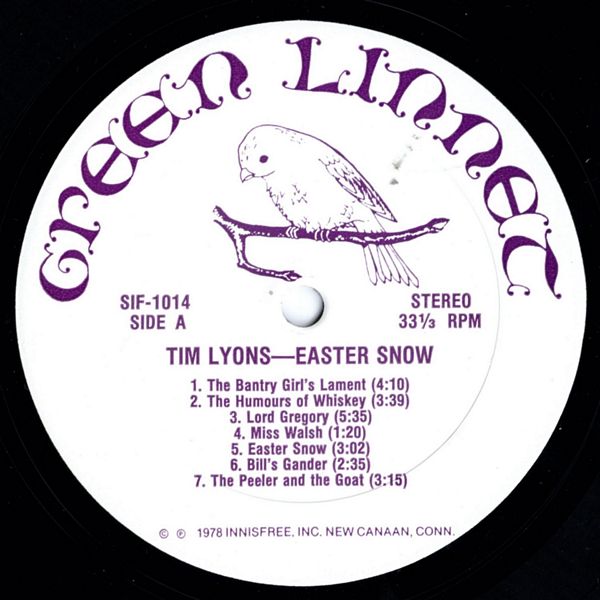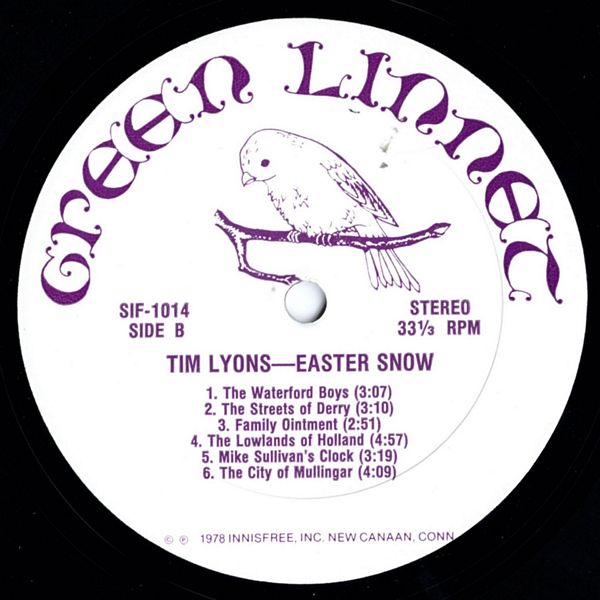
 |



|
Sleeve Notes
Tim Lyons is one of the best singers in Ireland. He was born in County Cork, but moved to England with his family at the age of twelve. The family settled in the Midlands, and Tim grew up and went to school there. There wasn't a great deal of Irish music in the area, but he did hear an occasional singer or musician on the radio and in a couple of local bars. He didn't, however, start singing himself until around 1959 when he moved back to Ireland.
A fellow-worker, Christy Kelly, was a good singer and taught Tim several songs. From listening to Christy and later to such notable singers as Paddy Tunney and Joe Heaney, Tim picked up the rudiments of the Sean-nós (old style) singing. He increased his repertoire rapidly and evolved his own distinctive singing style. By the mid-1960s, Tim was well-known as a first-rate singer in his own right. He moved back to England for some years and performed frequently on the English folk club circuit. In the early 1970s, he returned to Ireland and made his home in Newmarket-on-Fergus, County Clare, where he has lived ever since.
Tim continues to sing in various pubs around County Clare, and early in 1978 he became a member of the well-known Irish band. De Danann
Tim is also a fine button accordion player, with a large repertoire of dance tunes which he plays in the easy rhythmic tempo favored by the old style melodeon players. I have heard him play in sessions on many occasions with his brother, John, who is also a fine singer and button accordion player, with a solo album on the Topic label to his credit. The elegant, unhurried playing of the two button accordions together provides an interesting contrast to the hard driving style generally favored by Clare accordion players. I look forward in time to a recording of this music.
Tim has been one of my favorite singers since I first met him in London in 1969. He has a powerful voice that can cut right through a noisy crowd in a bar room setting, and yet he can exercise the most consummate skill and control of the most intricate melodic embellishments when singing a long introspective ballad such as Lord Gregory
He is the very rare combination of all-round entertainer and singer's singer. This record bears witness to his uniqueness.
Mick Moloney
The Bantry Girl's Lament tells of the loss of a local hero during the period of the Peninsula War between England and Spain I learned it from the singing of Andy Murdiff of Dublin.
The Humours of Whiskey is a grand jig song abounding in clever internal rhyming It is in praise of poteen, our illegal whiskey. The air itself is popular among instrumentalists as a dance tune. Johnny Moynihan used to sing this around the fleadh cheoils during the 1960s.
Lord Gregory originated as a Scots ballad collected by Child under the name The Lass of Loch Royal. This version comes from the singing of the late Elizabeth Cronin, a grand old style singer who came from mid-Cork.
Miss Walsh, a jig, is lilted here. Lilting is also called mouth music, jigging, pus music, diddling, and so on. There is a very advanced form of this in Scotland, where the Gaelic is used to reproduce the sound of the pipes.
Easter Snow, which I learned from the singing of Paddy Tunney, is a beautiful slow air. Its story is incomplete, but some day I might find the rest of it somewhere. The name is a bastardisation of an old townland in County Leitrim called Estersnowe.
Bill's Gander — has, again, internal rhyming, but this time it is much more developed. Instead of the rhyming words occurring at the ends of the lines, you find them popping up in the middle or 1/4 way through, or indeed anywhere in the lines. It's a song from the North Cork/Kerry border country, full of that dry humour typical of the area. The "tea" in this song could just as easily be "poteen" in respectable disguise Willie Clancy enlivened many a session in his lifetime with this one.
The Peeler and the Goat — Sir Robert Peel was made Secretary of Ireland in 1812. He quickly introduced the country's first police force, which were soon labelled "Bobbies" or "Peelers." They soon proved themselves a nuisance to one and all, and petty incidents abounded. At Bansha in County Tipperary, they impounded some straying goats which were obstructing the roadway A local bard, Darby Ryan, wrote a song of ridicule and great humour to mark the occasion. The song takes the form of a conversation between the two sides, and many political facets of that time are mentioned within the lines.
The Waterford Boys — Internal rhyming occurs in this jig song, which I first heard sung by Paddy Tunney. The air is popular at this time among musicians in the country, as a jig, of course.
The Streets of Derry — I know very little about this song. I heard a Derry singer Bernard Heany singing it.
Family Ointment is one of the nonsense songs, or songs which describe an imaginary farcical situation There are many of these in the tradition, and they are an important part of it. This one, which I learned from the singing of the late Willie Clancy, would seem to be a product of the North Cork/Muskerry area, judging by its rough, almost bawdy, humour
The Lowlands of Holland is a broadside ballad of which there are many versions around the British Isles It deals with the system of "pressing" able-bodied men into the British Services to fight the Empire's wars. Again, I learned this from Paddy Tunney.
Mike Sullivan's Clock — Muskerry always was, and still is, steeped in traditions. The bard flourishes now as in bygone days. This song undoubtedly is a poetic exaggeration of some local incident which provoked much laughter at the time, though the exact details are unknown to us. This is sung frequently around Cúl Aodh near Baillevourna I heard a fine singer from this area singing it — Dónal O Suillibhán (Donal Sullivan).
The City of Mullingar was learned from listening to Paddy Williams of Doolin, County Clare. It is another tongue-in-cheek exaggeration of the midland town of Mullingar. The air belongs to an Irish language song, Preab San Ol. It appeared in W.J. Rankine's SONGS AND FABLES (Glasgow, 1874), then entitled An Ode in Praise of the City of Mullingar.
Tim Lyons